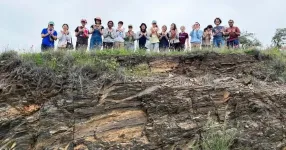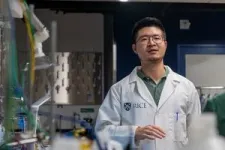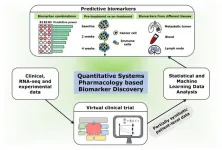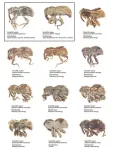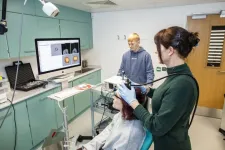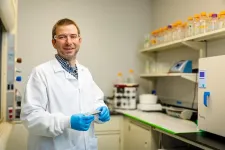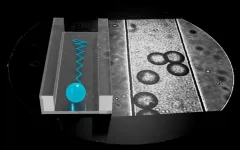(Press-News.org) Bill Dingus ’81, a Rice University alumnus, and his wife Mary Anne have pledged $1 million to support the university’s Human Impacts on the Earth Fund, dedicated to mitigating and addressing the negative environmental effects caused by human activities on the planet. Additionally, the Dingus family is matching other donors’ contributions to the fund up to $250,000.
The Dingus’ donation enables the launch of the Earth and Planetary Opportunities in Research (EXPLORE) program, a new initiative offered through the Department of Earth, Environmental and Planetary Sciences (EEPS) that allows undergraduates of any major hands-on experience in research projects related to Earth and space. Moreover, the fund will support fellowships for graduate students working in the broad areas of environmental science and sustainability, inspired by the research legacy of Rice Emeritus Professor John Anderson.
“Given the environmental challenges we Earthlings face, it makes perfect sense to empower some Rice students to help solve the problem,” said Bill, who earned his Bachelor of Arts in geology from Rice in 1981.
EXPLORE students will collaborate with EEPS faculty or affiliates to identify research, experiential learning or internship opportunities with the goal of gaining valuable insight into the scientific challenges of the modern world. This year’s cohort of “EXPLORERS” are studying a range of subjects, from emerging carbon markets to Trojan asteroids to geothermal energy systems.
In addition, the fund will finance experiential courses, interdisciplinary seminars and vital equipment and will reside in the Wiess School of Natural Sciences to be managed by EEPS Chair Juli Morgan.
“We’re incredibly grateful to the Dingus family for their generosity,” Morgan said. “Their support allows us to offer life-changing research opportunities to students, empowering them to explore critical societal issues including climate change, natural resource management, environmental issues and sustainability.”
For Bill and Mary Anne, their gift is also a tribute to their family’s long-standing connection to Rice. Their son, along with Bill’s three sisters, also attended the university, and Mary Anne’s father, the late Charles Duncan, was a trustee emeritus of Rice.
“My father believed that investing in young people, particularly Rice students, was the best investment he could make,” Mary Anne said. “He believed that Rice’s leadership in science, technology, research, music and public policy could build a brighter future and have global impact.”
For anyone wishing to support the Human Impacts on the Earth Fund and have their donation matched dollar for dollar by Bill and Mary Anne, you can join their efforts with a gift by visiting the Human Impacts on the Earth Fund website.
END
Bill and Mary Anne Dingus commit $1M to fund Human Impacts on the Earth Fund at Rice
2024-10-29
ELSE PRESS RELEASES FROM THIS DATE:
Most patients can continue GLP-1 anti-obesity drugs before surgery
2024-10-29
Most patients may continue to safely take glucagon-like peptide-1 (GLP-1) receptor agonists as prescribed before undergoing elective surgery and gastrointestinal endoscopies, according to new clinical guidance released today by five surgical and medical societies including the American Society for Metabolic and Bariatric Surgery (ASMBS), American Society of Anesthesiologists (ASA), American Gastroenterological Association (AGA), International Society of Perioperative Care of Patients with Obesity (ISPCOP), and Society of American Gastrointestinal and Endoscopic Surgeons (SAGES).
The guidance, published online in Surgery for Obesity and Related Diseases ...
Computational tool developed to predict immunotherapy outcomes for patients with metastatic breast cancer
2024-10-29
FOR IMMEDIATE RELEASE
Using computational tools, researchers from the Johns Hopkins Kimmel Cancer Center and the Johns Hopkins University School of Medicine have developed a method to assess which patients with metastatic triple-negative breast cancer could benefit from immunotherapy. The work by computational scientists and clinicians was published Oct. 28 in the Proceedings of the National Academy of Sciences.
Immunotherapy is used to try to boost the body’s own immune system to attack cancer cells. However, only some patients respond to treatment, explains lead study author Theinmozhi Arulraj, Ph.D., a postdoctoral fellow at Johns Hopkins: “It’s really important ...
Cerebral embolic protection by geographic region
2024-10-29
About The Study: The PROTECTED transcatheter aortic valve replacement (TAVR) trial could not show that the use of cerebral embolic protection (CEP) had a significant effect on the incidence of periprocedural stroke during TAVR. Although there was no significant interaction by geographic region, this exploratory post hoc analysis suggests a trend toward greater stroke reduction in the U.S. cohort but not in the outside the U.S. cohort. These findings are hypothesis generating, and further research is needed to determine if regional differences in patient characteristics or procedural practices ...
12 new Oriental weevil species discovered using advanced imaging tools
2024-10-29
Jake Lewis, an entomologist in the Environmental Science and Informatics Section at the Okinawa Institute of Science and Technology (OIST), is fascinated by weevils, a diverse group of beetles that includes many species with elephant trunk-like mouthparts (called a rostrum). Weevils provide various ecosystem services such as pollination and decomposition, but some species are serious pests known to decimate crop fields and timber forests.
Using x-ray microtomography, a 3D imaging technique ...
Ultrasound can be used as search and rescue tool for the brain
2024-10-29
Ultrasound, once used almost exclusively to take images of the body, is quickly developing into a targeted therapy that can have a potentially life-changing impact on our brains, according to the authors of a new article.
For decades, health professionals across the world have used ultrasound as a means of monitoring the development of unborn babies and assessing the health of patients’ internal organs.
But writing in the journal PLOS Biology, researchers from Stanford University, the University of Plymouth, and Attune Neurosciences say it has now been demonstrated to offer a non-invasive and precise way of targeting ...
Department of Defense funds study of gene therapy for muscular degeneration
2024-10-29
The U.S. Department of Defense awarded just under $514,000 to an interdisciplinary team of researchers at the U of A to study the efficacy of “self-delivering” gene editors in the treatment of Duchenne Muscular Dystrophy, or DMD.
DMD results from a mutation in the dystrophin gene and is one of the most severe inherited muscular dystrophies, leading to deterioration of the muscle fibers. Presently, there is no cure, but advances in treatment have helped patients live longer, better lives.
Gene therapy designed to ...
People’s exposure to toxic chemicals declined in the U.S. following listing under California law
2024-10-29
With growing concern about the ubiquity of toxic chemicals in consumer products, many states have passed laws aimed at protecting people from harmful substances in everyday items like cosmetics, cleaning supplies, plastics, and food packaging. California’s Proposition 65, for instance, is considered one of the most extensive toxics laws in the country.
But does the law work? According to a new study published in the journal Environmental Health Perspectives, it does.
“Not only have people’s exposures to specific toxic chemicals gone down in California, ...
Trauma, homelessness afflict gender affirming care patients at higher rates
2024-10-29
A survey of patients receiving gender affirming care shows that commercial insurance pays for most of their treatments, they receive less care in the South than other parts of the U.S. and they deal with disproportionate levels of housing insecurity and trauma compared to others, according to a new study by researchers at the Colorado School of Public Health and the University of Colorado Anschutz Medical Campus.
The study, using data provided by Kythera Labs, a healthcare clearinghouse, examined millions of insurance claims by patients undergoing gender affirming care (GA) and those not. It also looked at social determinants of healthcare (SDOH), non-medical factors ...
New $5 million DoE award supports KU startup’s green hydrogen energy research
2024-10-29
LAWRENCE — With $5 million in support from the U.S. Department of Energy, the University of Kansas and Avium — a startup firm founded by researchers from KU’s School of Engineering — aim to make clean hydrogen more affordable.
According to the DoE, the work at KU is part of $750 million in funding for 52 projects across 24 states “to dramatically reduce the cost of clean hydrogen and reinforce American leadership in the growing hydrogen industry.”
Green hydrogen is a key tool in the worldwide ...
A navigation system for microswimmers
2024-10-29
Microswimmers often need to independently navigate narrow environments like microchannels through porous media or blood vessels. The swimmers can be of biological origin, like algae or bacteria, but also constitute custom designed structures used for the transport of chemicals and drugs. In these cases, it is important to control how they swim in relation to walls and boundaries - as one might want them to exchange fuel or information, but also avoid them to stick where they are not supposed to.
Many swimmers are electrically ...
